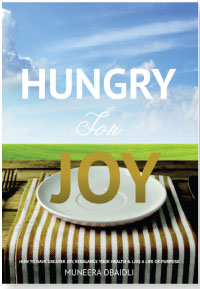A year since we last spoke with holistic wellness coach Muneera Obaidli, she’s now got her new book Hungry for Joy coming out in 2015. She tells Georgie Bradley why we have to ditch diets and just be more choosey with our food rather than prohibit it.
How many times have we begun a new year with the die-hard promise that we will shape up and not give in? It might last for the first few weeks but a whiff of a freshly baked cake or those strategically placed chocolate bars at the supermarket check-out weakens us. With a huge eating out culture in Bahrain, it’s difficult and anti-social to diet.
 But diet is a dirty word; something that complicates and deprives our system. If you scroll through a random feed of Instagram posts you’ll notice the world has gone #raw without compromising the quality and quantity of food, in fact we’re being better to our bodies. Ever since the ‘eat clean’ revolution began – along with the pioneering Wholefoods and Planet Organic people – it has shifted mindsets and repurposed our relationship with food.
But diet is a dirty word; something that complicates and deprives our system. If you scroll through a random feed of Instagram posts you’ll notice the world has gone #raw without compromising the quality and quantity of food, in fact we’re being better to our bodies. Ever since the ‘eat clean’ revolution began – along with the pioneering Wholefoods and Planet Organic people – it has shifted mindsets and repurposed our relationship with food.
Muneera Obaidli sees it as a lifestyle more than anything. With her new book coming out Muneera backtracks her gastronomic adventure.
“I always loved making people happy through food. When I was younger I cooked and shared it around.” This was before she got her degree in culinary arts from London branch of Le Cordon Bleu and her certificate in holistic integrative nutrition from the Institute of Integrative Nutrition in New York. Although before she went down this avenue of food, there wasn’t any real health concept to her cooking. “Through learning more about food though, it opened me up to new things. After that I wasn’t willing to feed people food I wouldn’t eat myself. And luckily people were saying they feel really good eating my food and asked if I could do a programme for them.” That’s when her health food company started in 2006.
 The problem with food is that it’s deep-rooted in our emotions. Often, our food consumption or lack of it, harbours bigger issues at hand. Food is all about control. When people deprive themselves it’s a way of gaining control in one area of their life where they don’t have any in others.
The problem with food is that it’s deep-rooted in our emotions. Often, our food consumption or lack of it, harbours bigger issues at hand. Food is all about control. When people deprive themselves it’s a way of gaining control in one area of their life where they don’t have any in others.
“Some people are very particular and strict with every morsel that goes into their mouth but when you look at them they don’t look like the picture of health. They are not healthy and happy. It’s one thing when you have an allergy or an intolerance to a food but when it is self-inflicted you make food the enemy and that’s not the point.”
Still, people want a quick fix. They resort to low calorie or low fat foods, which from what we have come to learn, do us more harm than good with hidden sugars and strange concoctions of ingredients. “Diet foods are not sustainable. You have to prioritise and take small steps. Don’t expect a magic pill. Nutritionally dense foods like kale and quinoa are much more sustainable.”
But Muneera hates the term ‘health food’. “It implies that there is food and non food.” With each of her clients she goes about food in different ways but with the same goal of reaching a path of joy. “There is no single ‘Magna Carta’ plan for everyone to follow. It is all about what works for you.”
Say, for instance, you’re on a major health kick, you’re eating the right foods and you’re feeling great but then you give in to that temptation after ‘x’ amount of months of being good. How can we put a stop to this yo-yo behavior once and for all?
“It’s all about finding alternatives. It’s not about deprivation at all – because if you cut everything out you will binge sooner rather than later. It’s always important to upgrade. I’m not going to tell someone who eats McDonald’s three times a day to eat sprouts and start juicing. It’s not going to work for them. If you like burgers, how are you going to make it better for you? There are so many alternative, healthier ways to make burgers.”
Although we’re human, we mess up. “My clients might come to me with their heads bowed down and admit to giving into bad food and I rejoice on their behalf. They’re usually really confused! If someone has been eating really well and then they eat garbage, they feel it! That is your motivation. The people I work with want to change their life and part of that is messing up. It’s the only way to understand what works for you and what makes you feel good. But if you know you’re going to feel guilty afterwards, you may as well not have that particular food.”
Even Muneera has her moments. “Last month I was in New York and I had a massive croissant. I usually don’t eat wheat at all. I had an almond milk hot chocolate with it too. You have to get your pleasures in life. The reason I had the croissant was because when I met with Joshua Rosenthal, the founder of integrative nutrition, he said: ‘You’re in New York, there are so many things to do, be bad!’ – it’s part of the coaching he does with people. One of the homework assignments is to be bad. I have to say I enjoyed that croissant. But of course I felt bad, but I knew I would.”
As part of her coaching, Muneera adopts a word which many of us are new to: holistic. It’s all about bringing food and lifestyle together because they’re not mutually exclusive, they influence one another. “I have a tool I use called the circle of life, it’s a big wheel that is divided into wedges and each has an aspect of life that creates balance. Food is different for everyone. Everyone has different nutritional needs based on age and what they do: a sumo wrestler eats very differently from a ballerina! In terms of life, the wheel will have ‘home cooking’ ‘finances’ or ‘education’ and ‘social life’ – dots are put in the centre of the wheel if you’re really miserable and at the peripheral if you are very happy with your life. If you connect the dots and the shape is spherical, you’re happy, but more often than not it’s more squiggly. I honestly believe when you’re very happy you’ll follow through with your goals.”
“Hungry for Joy is about the journey of health and wellness. I really find it’s about finding joy and for people to find their own joy. Why do people really want to be healthy? It’s about finding joy in life. A lot of it is compensated with food and destructive behavior. The book has quite an extensive recipe section but also a meditation and exercise portion and super foods.”
Is she wanting to be the Gwyneth Paltrow of Bahrain? “I’m not keen on being a public figure. I just like working with people.”
Visit: www.muneera.com


































